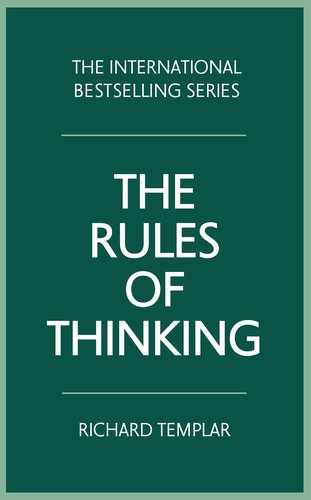Do you believe in telepathy – that some people can tell what others are thinking when they’re not even in the same room?
One of the most pervasive elements of pseudo-scientific thinking is to believe a thing can’t be true unless you can prove it is. Many people will tell you that, as there’s no scientific proof for these things, they can’t be true. But remember, there was a time when science couldn’t yet prove that the earth went around the sun. Didn’t stop it doing it though.
I’m not saying that I believe in telepathy. But I don’t pooh-pooh it either. Sadly I don’t believe in magic (I wish I did) so personally I reckon that if it’s true, there is a rational scientific explanation that no one has yet found. I have had some experiences that would seem to support the argument for telepathy, but I can’t prove they weren’t just surprising coincidences.33
So don’t get tricked into ruling things out just because there’s no proof. Clearly you have to apply your intelligence here. Almost all of physics is ultimately unprovable, as physicists will tell you, and operates on the principle that once the weight of argument becomes overwhelming, scientific theories have to be assumed to be true. Also, looking outside the world of science, it’s reasonable for me to assume my family love me, even though I only have their word for it.
On the other hand, don’t mistake evidence for proof. I know a few people who can quite exasperatingly mix up their own experience for proof. If you tell them that research shows, for example, that more people with brown eyes are good at maths (yes, I made that up) immediately they will try telling you that it can’t be so because their friend is really good at maths and has blue eyes, so there! Or their other friend has brown eyes and is rubbish at maths.
A good thinker understands that this means zilch. The data (that I made up) didn’t say all brown eyed people are good at maths. Nor did it say that no non-brown-eyed people were good at maths. Just that being good at maths correlated more highly with brown eyes than other eye colours. One person’s experience might be unexpected, but it doesn’t negate all my (meticulous and hard-earned) research results. Also, many people presented with this data will tend to notice the exceptions because they stand out. So while they might immediately think of a blue-eyed friend who is maths-minded, it may actually be that if they surveyed all their friends the results would bear out my own research. If I hadn’t made it up.
So don’t be guilty of muddling up evidence and proof, or assuming something unproven can’t be true. Keep an open mind and evaluate all the data you’re given as neutrally and dispassionately as you can.
DON’T BE GUILTY OF MUDDLING UP EVIDENCE AND PROOF
_________________________
33 And remember, it would be a really surprising coincidence if coincidences never happened.
